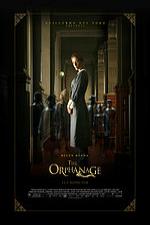
Knight at the Movies Archives
The year ends on a high note with two superlative foreign films, a thrilling ghost story and an emotionally complex gay drama
The Orphanage, a Spanish film presented and produced by Pan’s Labyrinth writer-director Guillermo del Toro is that rarest of all
cinematic marvels – a ripping good ghost story in the tradition of other paranormal thrillers like The Haunting, The Others and The Sixth
Sense. Better – it delivers the requisite twists and turns but also has an emotionally complex ending that is deeply satisfying. Best
– it’s done with psychological effects and a minimum of gore. Good news: this one is safe for gore-a-phobics.
The story focuses on Laura (Belén Rueda, terrific and in nearly every scene) a pretty blonde woman who with her easy going, patient
husband Carlos (Fernando Cayo) is living in what used to be the orphanage where she grew up. Laura and Carlos are remodeling
this Victorian with the intention of becoming foster parents to handicapped children. In the meantime, they are raising their dark
curly haired adopted son Simón who is HIV positive (and has the serious countenance of other children stricken by severe illness).
Simón has assorted imaginary friends that he loves to play games with. One day Laura is drawn into the game – a treasure hunt
with clues that seems to point to something disturbing. An undercurrent of unease permeates the house as surely as the bad
dreams of both Laura and her little boy.
Then, abruptly, during a lawn party welcoming the other children Simón suddenly disappears. Did the child in the hideous scarecrow
mask who locked Laura into the bathroom have something to do with it (a mask she remembers from her childhood)? Laura, who’s
temporarily in a wheelchair (shown on the second floor in a suspense moment not unlike a similar one in What Ever Happened to Baby
Jane?), is determined to find out. She begins to figure out that the orphanage of her childhood hid a terrible secret and perhaps all
its former residents weren’t so well treated. In the film’s most unnerving sequence, Geraldine Chaplin as a medium is brought in to
conduct a séance. Then Laura begins to suspect that perhaps something from the paranormal world has spirited Simón away. Here
we get into Poltergeist territory and the film builds to its startling conclusion.
In the tradition of all great ghost story movies a psychological breakdown accompanies the paranormal activity and by the time the
resolution approaches both elements have intertwined to a point where one is inseparable from the other. There are snatches of
other ghost story movies in Sergio G. Sanchez’ intricate script – The Others, The Exorcist, The Ring, The Sixth Sense, and, again, lots of
Poltergeist – and like them the importance of the mother-child relationship is also explored. Again, like those movies you end up
feeling something other than fear. The Orphanage is the bravura directorial debut of Juan Antonio Bayona who exhibits the same
assured storytelling techniques of del Toro, his mentor. Expect to hear a lot of excited buzz about this entertaining film. In Spanish
with subtitles.
+++++++++++++++++++++++++++++++++++++++++++++++++++++++++++++++++++++++++++++++++++++++++++++
A haunting of an altogether different sort happens in The Man of My Life which is playing an exclusive engagement at Chicago's
Siskel Film Center December 28-January 3. Into the sunny, languid summer in the French countryside a disturbance is about to
come into the lives of Frédéric (Bernard Campan) and his comely blond wife Frédérique (Lèa Drucker). The disturbance is named
Hugo (Charles Berling), the new neighbor that Frédéric has encountered during his morning run through the forest. At the urging of
Frédérique he invites Hugo to join them at a family dinner. The couple along with their toddler, have family and friends staying for a
vacation. During dinner the attractive Hugo reveals that he is Swiss, a flight attendant, and, in his words “a fag.” This information is
all given in a very matter of fact, I-dare-you-to-challenge-me manner but homosexuality is hardly an issue for this bourgeois group
and no one does.
Later, after much wine, Frédéric and Hugo continue to talk alone after Frédérique has gone to bed. When Hugo complains of the
chill in the night air Fred brings him a pull over sweater as the two talk of relationships and love. Hugo tells Fred firmly that sharing
your life is the ultimate destruction while Fred argues for love. At dawn Hugo departs, promising to return the sweater. Nothing
physical has occurred and nothing that would be construed as a seduction but nevertheless nothing for either man will ever be the
same.
Throughout the rest of the movie director Zabou Breitman (who co-wrote the script with Agnès de Sacy) returns repeatedly to this all
night conversation and each time new, tiny, intimate moments are revealed. Without a touch or a glance, it’s clear that the
emotional intimacy that the two men have shared with one another has awakened something neither has previously acknowledged –
a growing awareness of same sex attraction for Fred and a desire for a relationship for Hugo. The chill is first felt in Fred’s bedroom
when he loses interest in Frédérique. She suspects the cause but there’s nothing overt to point to. Later, Hugo, the avowed loner,
will find himself coming to terms with some deep seated anger and loneliness as his father is dying.
This exquisite, sophisticated relationship movie is chock full of scenes ripe with dramatic intensity but they’re presented with a
minimum of histrionics, an eye for the telling detail, and a tender lyricism rare for a film whose subject matter would usually be
tossed off as nothing more than a variation on the usual love triangle. But The Man of My Life is much more complex than that puny
description implies and cuts much deeper because of it. In French with subtitles. www.siskefilmlcenter.com
cinematic marvels – a ripping good ghost story in the tradition of other paranormal thrillers like The Haunting, The Others and The Sixth
Sense. Better – it delivers the requisite twists and turns but also has an emotionally complex ending that is deeply satisfying. Best
– it’s done with psychological effects and a minimum of gore. Good news: this one is safe for gore-a-phobics.
The story focuses on Laura (Belén Rueda, terrific and in nearly every scene) a pretty blonde woman who with her easy going, patient
husband Carlos (Fernando Cayo) is living in what used to be the orphanage where she grew up. Laura and Carlos are remodeling
this Victorian with the intention of becoming foster parents to handicapped children. In the meantime, they are raising their dark
curly haired adopted son Simón who is HIV positive (and has the serious countenance of other children stricken by severe illness).
Simón has assorted imaginary friends that he loves to play games with. One day Laura is drawn into the game – a treasure hunt
with clues that seems to point to something disturbing. An undercurrent of unease permeates the house as surely as the bad
dreams of both Laura and her little boy.
Then, abruptly, during a lawn party welcoming the other children Simón suddenly disappears. Did the child in the hideous scarecrow
mask who locked Laura into the bathroom have something to do with it (a mask she remembers from her childhood)? Laura, who’s
temporarily in a wheelchair (shown on the second floor in a suspense moment not unlike a similar one in What Ever Happened to Baby
Jane?), is determined to find out. She begins to figure out that the orphanage of her childhood hid a terrible secret and perhaps all
its former residents weren’t so well treated. In the film’s most unnerving sequence, Geraldine Chaplin as a medium is brought in to
conduct a séance. Then Laura begins to suspect that perhaps something from the paranormal world has spirited Simón away. Here
we get into Poltergeist territory and the film builds to its startling conclusion.
In the tradition of all great ghost story movies a psychological breakdown accompanies the paranormal activity and by the time the
resolution approaches both elements have intertwined to a point where one is inseparable from the other. There are snatches of
other ghost story movies in Sergio G. Sanchez’ intricate script – The Others, The Exorcist, The Ring, The Sixth Sense, and, again, lots of
Poltergeist – and like them the importance of the mother-child relationship is also explored. Again, like those movies you end up
feeling something other than fear. The Orphanage is the bravura directorial debut of Juan Antonio Bayona who exhibits the same
assured storytelling techniques of del Toro, his mentor. Expect to hear a lot of excited buzz about this entertaining film. In Spanish
with subtitles.
+++++++++++++++++++++++++++++++++++++++++++++++++++++++++++++++++++++++++++++++++++++++++++++
A haunting of an altogether different sort happens in The Man of My Life which is playing an exclusive engagement at Chicago's
Siskel Film Center December 28-January 3. Into the sunny, languid summer in the French countryside a disturbance is about to
come into the lives of Frédéric (Bernard Campan) and his comely blond wife Frédérique (Lèa Drucker). The disturbance is named
Hugo (Charles Berling), the new neighbor that Frédéric has encountered during his morning run through the forest. At the urging of
Frédérique he invites Hugo to join them at a family dinner. The couple along with their toddler, have family and friends staying for a
vacation. During dinner the attractive Hugo reveals that he is Swiss, a flight attendant, and, in his words “a fag.” This information is
all given in a very matter of fact, I-dare-you-to-challenge-me manner but homosexuality is hardly an issue for this bourgeois group
and no one does.
Later, after much wine, Frédéric and Hugo continue to talk alone after Frédérique has gone to bed. When Hugo complains of the
chill in the night air Fred brings him a pull over sweater as the two talk of relationships and love. Hugo tells Fred firmly that sharing
your life is the ultimate destruction while Fred argues for love. At dawn Hugo departs, promising to return the sweater. Nothing
physical has occurred and nothing that would be construed as a seduction but nevertheless nothing for either man will ever be the
same.
Throughout the rest of the movie director Zabou Breitman (who co-wrote the script with Agnès de Sacy) returns repeatedly to this all
night conversation and each time new, tiny, intimate moments are revealed. Without a touch or a glance, it’s clear that the
emotional intimacy that the two men have shared with one another has awakened something neither has previously acknowledged –
a growing awareness of same sex attraction for Fred and a desire for a relationship for Hugo. The chill is first felt in Fred’s bedroom
when he loses interest in Frédérique. She suspects the cause but there’s nothing overt to point to. Later, Hugo, the avowed loner,
will find himself coming to terms with some deep seated anger and loneliness as his father is dying.
This exquisite, sophisticated relationship movie is chock full of scenes ripe with dramatic intensity but they’re presented with a
minimum of histrionics, an eye for the telling detail, and a tender lyricism rare for a film whose subject matter would usually be
tossed off as nothing more than a variation on the usual love triangle. But The Man of My Life is much more complex than that puny
description implies and cuts much deeper because of it. In French with subtitles. www.siskefilmlcenter.com
Fantastic Foreign:
The Orphanage-The Man of My Life
12-26-07 Windy City Times Knight at the Movies Column
By Richard Knight, Jr.
The Orphanage-The Man of My Life
12-26-07 Windy City Times Knight at the Movies Column
By Richard Knight, Jr.


